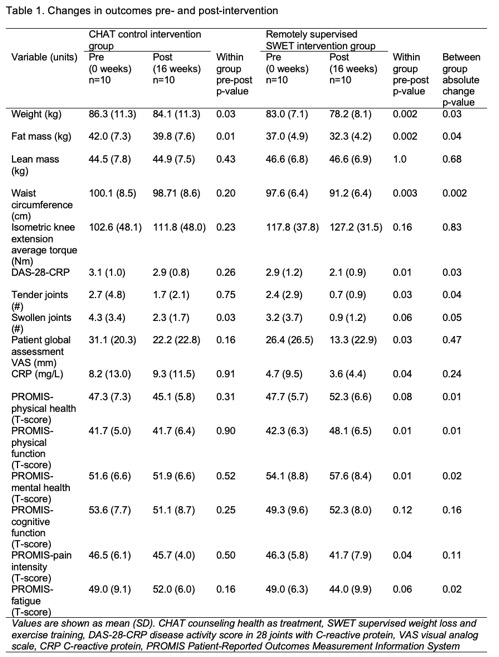Session Information
Session Type: Poster Session B
Session Time: 9:00AM-11:00AM
Background/Purpose: Older persons with rheumatoid arthritis (RA) are at increased risk for sarcopenic obesity, physical disability, adverse drug events, and cardiovascular disease; thus, there is a need for novel, non-pharmacologic interventions to improve clinical care in this patient population. Weight loss and exercise training have well-established benefits of improving clinical outcomes in non-RA populations; however, the effects of combined lifestyle interventions for older patients with RA are understudied. In this randomized controlled trial of older patients with RA and overweight/obesity, our goal was to identify the effects of a remotely supervised weight loss and exercise training (SWET) intervention on disease activity and patient reported outcomes.
Methods: Older (age 60-80 years), previously sedentary participants with RA and overweight/obesity (BMI 28-40 kg/m2), who all satisfied 2010 ACR/EULAR RA classification criteria, were randomized to 16 weeks of SWET or a counseling health as treatment (CHAT) control group. The SWET intervention group completed aerobic training (150 minutes/week moderate-to-vigorous exercise), resistance training (2 days/week), and a hypocaloric diet (7% weight loss target). The CHAT control group completed 2 baseline visits of diet and exercise counseling followed by usual care. Baseline and post-intervention assessments included body composition assessment (BOD POD®), minimal waist circumference measurement, muscle strength assessment (isometric knee extension), RA disease activity (DAS-28-CRP) assessment, and Patient-Reported Outcomes Measurement Information System (PROMIS) questionnaires. Within group pre- versus post-intervention changes were assessed using Wilcoxon signed rank tests. Between group comparisons of outcome absolute change (post – pre) were assessed using regression modeling controlling for the baseline outcome. Relationships were assessed using Spearman’s correlations. Statistical significance for the primary outcome (between group changes in DAS-28-CRP) was established at p< 0.05.
Results: Compared to the CHAT control group (n=10, 9 female, mean age 65.6±5.4), older RA participants who completed the remotely supervised SWET intervention (n=10, 7 female, mean age 67.7±5.4) significantly improved DAS-28-CRP (p=0.03) (Table 1). SWET group participants also comparatively improved patient reported outcomes, including physical health, physical function, mental health, and fatigue (p< 0.05 for all) (Table 1). Decreases in DAS-28-CRP among all participants (n=20) were associated with decreases in waist circumference (rho=0.48, p=0.03) and increases in leg muscle strength (rho=-0.57, p=0.01).
Conclusion: In older participants with RA and overweight/obesity, when compared to a lifestyle counseling control intervention, a remotely supervised weight loss and exercise training intervention significantly improved RA disease activity and multiple patient-reported assessments of overall health. Results of this randomized control trial support the use of multifaceted lifestyle interventions in the usual clinical care of older patients with RA.
To cite this abstract in AMA style:
Andonian B, Ross L, Sudnick A, Johnson J, Pieper C, Bales C, Porter Starr K, Kraus W, Huffman K. Remotely Supervised Weight Loss and Exercise Training Improves Disease Activity and Patient Reported Outcomes in Older Patients with Rheumatoid Arthritis [abstract]. Arthritis Rheumatol. 2023; 75 (suppl 9). https://acrabstracts.org/abstract/remotely-supervised-weight-loss-and-exercise-training-improves-disease-activity-and-patient-reported-outcomes-in-older-patients-with-rheumatoid-arthritis/. Accessed .« Back to ACR Convergence 2023
ACR Meeting Abstracts - https://acrabstracts.org/abstract/remotely-supervised-weight-loss-and-exercise-training-improves-disease-activity-and-patient-reported-outcomes-in-older-patients-with-rheumatoid-arthritis/

